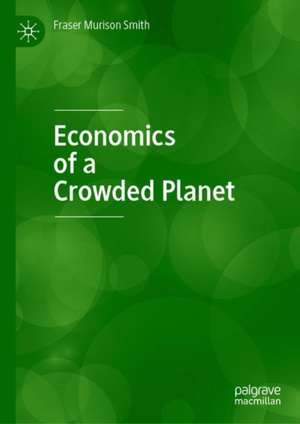Economics of a Crowded Planet
Autor Fraser Murison Smithen Limba Engleză Hardback – 22 noi 2019
The exposition reveals a paradigm called ‘market planetarianism’: the idea that the power of markets may be used to steer the economy toward a desired long-term goal. Both a prescriptive doctrine and an economic methodology, it treats the economy and nature as instances of complex, evolutionary systems, demanding analytical tools quiteunlike those of the 20th-century mainstream.
| Toate formatele și edițiile | Preț | Express |
|---|---|---|
| Paperback (1) | 477.28 lei 6-8 săpt. | |
| Springer International Publishing – 22 noi 2020 | 477.28 lei 6-8 săpt. | |
| Hardback (1) | 650.19 lei 6-8 săpt. | |
| Springer International Publishing – 22 noi 2019 | 650.19 lei 6-8 săpt. |
Preț: 650.19 lei
Preț vechi: 764.93 lei
-15% Nou
Puncte Express: 975
Preț estimativ în valută:
124.43€ • 129.43$ • 102.72£
124.43€ • 129.43$ • 102.72£
Carte tipărită la comandă
Livrare economică 14-28 aprilie
Preluare comenzi: 021 569.72.76
Specificații
ISBN-13: 9783030317973
ISBN-10: 3030317978
Pagini: 428
Ilustrații: XXIV, 428 p. 64 illus.
Dimensiuni: 148 x 210 mm
Greutate: 0.69 kg
Ediția:1st ed. 2019
Editura: Springer International Publishing
Colecția Palgrave Macmillan
Locul publicării:Cham, Switzerland
ISBN-10: 3030317978
Pagini: 428
Ilustrații: XXIV, 428 p. 64 illus.
Dimensiuni: 148 x 210 mm
Greutate: 0.69 kg
Ediția:1st ed. 2019
Editura: Springer International Publishing
Colecția Palgrave Macmillan
Locul publicării:Cham, Switzerland
Cuprins
1. Introduction.- 2. Biophysical Context of the Economy.- 3. Simple Physical Model of Nature and Economy.- 4. Subsystem Model of the Economy.- 5. Rationale for an Economics of a Crowded Planet.- 6. Economic Orthodoxy and Emerging Pluralism.- 7. The Economics of Nature.- 8. Conventional Economics On a Crowded Planet.- 9. Framework for an Economics of a Crowded Planet.- 10. Requirements for a Future Economics.
Notă biografică
Fraser Murison Smith is an energy specialist in public utilities, formerly an information systems consultant and award-winning cleantech entrepreneur. After completing a PhD in theoretical ecology at Oxford University, he was a postdoctoral fellow at Stanford University in ecological economics. He has published papers on fisheries, biodiversity and economic development, as well as a book, Environmental Sustainability: Practical Global Implications (1997). Fraser and his wife, a healthcare technology leader, share their home in Northern California with two wonderful young children and a canoe and tent on standby for spontaneous forays into the surrounding mountains, rivers and lakes.
Textul de pe ultima copertă
This book asks the question, how would economics look today and into the future if one started with a blank sheet of paper? Written mainly for a technical audience, yet accessible to the lay reader, Economics of a Crowded Planet addresses the ontology, epistemology and methodology of a future economics as if from outside the economy looking in. It presents a conceptual framework for a future economics drawing from systems science and hierarchy theory, integrating central concepts from present-day economics, so as to orient the field in a direction that can serve society’s future needs in practical ways.
The exposition reveals a paradigm called ‘market collectivism’: the idea that the power of markets may be used to steer the economy toward a desired long-term goal. Both a prescriptive doctrine and an economic methodology, it treats the economy and nature as instances of complex, evolutionary systems, demanding analytical tools quite unlike those of the 20th-century mainstream.
The exposition reveals a paradigm called ‘market collectivism’: the idea that the power of markets may be used to steer the economy toward a desired long-term goal. Both a prescriptive doctrine and an economic methodology, it treats the economy and nature as instances of complex, evolutionary systems, demanding analytical tools quite unlike those of the 20th-century mainstream.
Caracteristici
Provides a new conceptual framework to understand the relationship between human economy and nature Combines ecological economics and complex systems theory Shows how elements of mainstream economics can be integrated into a generative economics of the future
